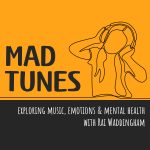![]() This is another article that was prompted by Hearing The Voice’s research into the lived experience of voice-hearing in all its complexity.
This is another article that was prompted by Hearing The Voice’s research into the lived experience of voice-hearing in all its complexity.
‘After I was called a freak I kept the fact I heard voices a secret, but they don’t scare me anymore’
As a study highlights how hearing voices isn’t always a sign of mental illness, Rachel Waddingham, who has made peace with her 13 voices, tells Lisa Salmon why this is an issue that we all need to hear about.
By Lisa Salmon, published in Belfast Telegraph
Hearing voices that nobody else can hear is generally thought of as a classic sign of serious mental illness. And sometimes, it is – but it might also be far more “normal” than many of us realise.
A study recently published by Durham University demonstrates how both people with and without psychiatric diagnoses can experience such “auditory hallucinations”. In fact, it’s estimated to be something that between 5-15% of adults will experience at some point during their lifetimes.
Many of these people may well have a serious mental illness, such as schizophrenia, but while the majority of the 153 voice-hearers questioned for the Durham University study had been diagnosed with a psychiatric condition, 26 had no history of mental illness.
It remains a complex area, and the majority of voice-hearers experience multiple voices with different genders, ages and characters.
These hallucinations can be extremely distressing and problematic, but they can also become a part of somebody’s life, that they comfortably co-exist with.
Dr Jim Bolton, a liaison psychiatrist in south London, explains that hearing voices appears to be a short-circuit in the brain.
“Research indicates that when we hear voices, the brain seems to mistake some of our own thoughts or inner speech for voices, as though they’re coming from outside of us,” he says.
The voices have the quality of somebody actually being there and speaking, and sound very real. Sometimes they’re voices of people the hearer recognises, other times they’re unfamiliar. What they say can vary widely, from being pleasant, to abusive or upsetting.
“Many people find the voices occur at particular times – for example when they’re under stress,” says Dr Bolton.
“Probably most of us experience auditory hallucinations, even though we might not be aware of it,” he adds. “In people who aren’t otherwise unwell, they’ll most often occur when we’re dropping off to sleep or waking up. You might hear your name being called, or the phone ringing.
“It can occur as part of normal experience, although it’s much more common in some of the mental disorders, particularly schizophrenia.”
While it’s potentially very reassuring that hearing voices does not automatically mean somebody’s mental health is in serious decline, it’s important to remember that, for many people, auditory hallucinations can occur alongside other symptoms, and seeking the appropriate diagnosis, treatment and support is vital.
“If somebody is experiencing hearing voices, I’d certainly recommend they discuss it with their doctor, and assess whether they’ve got any other symptoms,” says Dr Bolton.
“Very occasionally, I’ve met people who find the voices consoling in some way – they almost become a part of them. But for many more people, they’re irritating and upsetting.”
Rachel Waddingham is one such person who has learned to accept and live with her voices.
Diagnosed with a number of disorders, including schizophrenia in her early 20s after suffering various “traumas” when she was growing up, she hears about 13 voices. But although she’s been treated in psychiatric hospitals in the past, she no longer sees a psychiatrist, and has been off medication for five years.
Waddingham, now 37, explains: “Each of them is different – some have names, they’re different ages and sound like different people. Some of them are very angry and violent, others are scared, and others are mischievous.
“Sometimes, I hear a child who’s very frightened. When she’s frightened, I can sometimes feel pains in my body – burning.
“If I can help the voice calm down, the burning pains stop.”
As well as seeing mental health professionals, Waddingham attended her local Hearing Voices support group, and found ways of making sense of and coping with her voices.
“I no longer feel terrorised by them, even though some of them say some very frightening things,” she says.
“I now have a family of voices and have a better relationship with them. I can make a choice about how I respond to them – whether I listen to them, and how I reply.
“Some of them are now much more helpful – they can be a window to my feelings, letting me know about a problem I have in my life that I need to address.”
Waddingham, who is married and lives in Kent, is determined to raise awareness of the issue, and travels the world through her job as a freelance trainer and consultant for Behind The Label, training people in how to support those who hear voices, or have other sensory experiences. She’s also a trustee of the Hearing Voices Network.
She believes it’s vital there’s more open discussion about hearing voices – but being so candid about her own experiences has, on occasion, prompted cruel, misguided attacks.
“I’m the person sitting next to you on the train. I’m the person standing next to you at the pub. I am a normal person – the fact I hear voices and have had times when I’ve been overwhelmed, doesn’t make me a different species,” she stresses. “We all have something unique about us. The voices that I hear are just one thing about me that other people don’t share.
“Years ago, when I was struggling to cope, I wore the prejudice and stigma much more heavily, and felt I needed to keep my voices and visions secret. I no longer need to do this – even though being open about it does leave me open to attack. I’ve been called a freak, crazy, schizo, sick and dangerous.
“I’ve also been told that I’ve helped others open up. That’s what I focus on – if we don’t talk about voices, society’s attitude to it won’t change.”
She says she thinks she’ll always hear voices, but that’s fine.
“I don’t want to get rid of them,” Waddingham insists.
“As hard as it can be sometimes, the voices that are most angry and distressing represent parts of me that are still healing from the trauma I’ve survived.
“They are windows to the things I still need to work on, and I use them in my own recovery journey.
“I don’t know what I’d be like if I’d never heard voices, but I can honestly say I don’t want to find out.
“If my voices stopped, I’d probably miss them – things would be so much quieter.
“I’m still learning ways of relating to, and living with, the voices I hear,” she adds.
“I don’t describe myself as having a mental health problem, I think of myself as a survivor. I still hear voices, see visions and have other sensory experiences, but what’s different is that I no longer feel so confused by them that I believe the things that led to me getting diagnosed – the things that people felt were paranoid, or strange.
“I almost lost my life – both by suicide, and by giving up on the idea that there was a way forward for me.
“The hopelessness was more deadly than the voices.”
For advice and information about hearing voices, contact the Hearing Voices Network, tel: 0114 271 8210 or visit www.hearing-voices.org.




Recent Comments